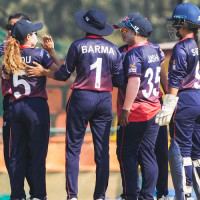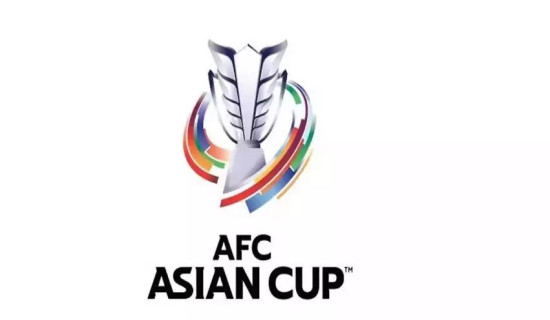- Monday, 19 January 2026
Except for departmental, clubs in ANFA Women’s League-2081 underprepared
Kathmandu, Sept.1: The first phase of the ANFA Women’s League-2081 is kicking off between 10 teams in the Kathmandu Valley from Sunday. Koshi Province and Waling Municipality are playing in the opener at ANFA Complex in Satdobato, Lalitpur.
Three of the 10 teams are departmental clubs – defending champions APF, Tribhuvan Army and Nepal Police. As they are departmental teams, the players undergo daily training. However, the other teams have participated in the League without enough training and preparation.
“We trained for five days before arriving in Kathmandu for the League. The players were assembled in Dharan once the League was certain to take place,” said Shyam Manandhar, head coach of the Koshi team.
The condition was similar for Waling’s team as stressed by coach Dilip Thapa. The coaches expressed dissatisfaction for not training enough at the pre-match conference of the League at the ANFA Building on Saturday.
“We cannot hold our players for months if there is no guarantee of the League,” said Thapa.
The other clubs participating in the League are Chandrapur Municipality, Bagmati Youth Club, Sankata Club, Sudurpashchim Province and Karnali Province.
Compared to the previous edition of the Women’s League in 2022 (the league was not organised in 2023), three of the eight teams did not continue.
“The League is organised through FIFA funding. The FIFA standards demand at least 90+ matches in the League. Thus, we could not organise it last year as we did not have enough teams to organise 90+ matches,” said the League’s technical coordinator Sanjeeb Mishra.
The current one is the first phase of the League where the 10 teams will compete in a single round-robin format across 45 matches. The top five teams will then participate in the Super League, the second phase, which will be played in a double round-robin format. Super League’s top four teams will compete in the Qualifiers, Eliminator and the Finals.
“In the first phase, the 10 teams will play nine matches each in the next month. There is SAFF in between Dashain and Tihar. We then have the 10th National Games. The second phase will take place after that,” Mishra added.
The ANFA has divided the League into phases to reach the ceiling of 90+ matches as directed by the FIFA standards.
“A club should also have played at least 10 matches a season to play in the AFC Women’s Champions League. The AFC allowed the 2022 edition winners, APF Club, to take part in the preliminary stage of the Champions League this season as a rare exception,” Mishra added.
ANFA spokesperson, Suresh Shah, expressed that the number of women footballers was on the rise across the country but they lacked professional football clubs to get associated with.
“It has been around 7-8 months since we formed our women’s team. However, they have not been training effectively, the reason being the lack of ground in Kathmandu. They trained in futsal for the League. The last two days’ training in the ANFA Complex was only when our players played in an 11-a-side ground,” said Rabindra Shilpakar, coach of Sankata.
“Clubs undertaken by local levels do not continue once the leadership changes. The private sector invests insufficient in men’s football and far lower in women’s. It is why ANFA’s prize for the Women’s League winner is also less,” said Sarila Shrestha Maleku, executive committee member of ANFA.
Shrestha, who is also the coordinator of the Women’s League, said that the prize amount can be increased if the League receives more sponsorship and has a good income from ticket sales.
The ANFA has declared Rs. 1 million for the League winners and Rs. 500,000 for the runners-up. The best player will receive Rs. 100,000, the fair play team gets Rs. 150,000 and the highest goal scorer and the best goalie will get Rs. 50,000 each. The player of the match in every game will receive Rs. 5,000.
“Women’s football is developing. The team is also targeting the 2031 World Cup. Yet, the need for better infrastructure, resources and environment remains,” Shrestha added.
The ANFA had planned to inaugurate the League from Dasharath Rangasala and organise one match a week in the country’s biggest football stadium. “The ground is not fit. We now plan to organise the Super League in Dasharath Rangasala,” said Mishra.
In a bid to make the League competitive against the three departmental clubs, the teams are allowed to play four foreign players. Koshi has brought three Indian players, Waling has three from Uganda and Sankata has four (two from Senegal and one each from Ghana and Nigeria).
Nevertheless, none of the clubs have been able to train with the foreign players. As per the coaches, their foreign players arrived recently due to troubles in the NOC and Visa processes.
“There are several football grounds of Nepal Police. However, we could not train in the rain. The ball does not roll in our grounds after and during rain. Yet, we are looking forward to the League with high motivation,” said Bhola Silwal, coach of the Nepal Police Club.
“We returned to Nepal on Friday after playing in the AFC Champions League. The players are in form. We plan to defend our title,” said APF’s Jibesh Pandey.






-original-thumb.jpg)
-square-thumb.jpg)









